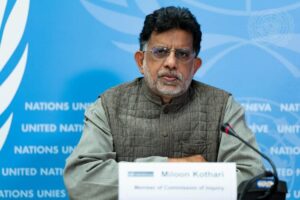Repeated omissions and selective coverage by Voice of America’s (VOA) Lisa Schlein is leaving the news site’s audience with a peculiarly selective picture of a United Nations’ anti-Israel Commission of Inquiry (COI). This picture keeps just out of frame the serious scandals tanking the COI’s credibility, and instead presents a sanitized and incomplete presentation of the COI’s activities.
Background
The COI was formed by the UN Human Rights Council after the Gaza conflict in May 2021 with an extraordinarily broad and political mandate that was widely criticized by democratic states. Since its formation, it has been plagued with repeated scandals, particularly with regard to the preexisting bias and antisemitic statements of the three COI members.

UN Commission of Inquiry member Miloon Kothari, who accused the “Jewish lobby” of controlling social media.
Over the summer, COI member Miloon Kothari claimed that the “Jewish lobby” controls social media. Fellow commissioner Chris Sidoti claimed that Jewish organizations from around the world are “GONGOs” (Government Organized Non-Governmental Organizations), effectively accusing Jewish civil society of operating at the direction of the State of Israel (i.e., accusing Jews of dual loyalty). Sidoti also employed the “Livingstone Formulation” by claiming that accusations of antisemitism “are thrown around like rice at a wedding.”
Likewise, COI Chairwoman Navi Pillay has repeatedly trolled the Jewish community for objecting to the severe antisemitism they experienced at a UN “anti-racism” conference in 2001. She also has a particularly lengthy record of predetermined conclusions on the exact questions she is supposed to be impartially investigating, including accusing Israel of apartheid and supporting the sanctioning of Israel.
Omission of Necessary Details Regarding the COI’s Credibility
Despite these controversies, VOA remained almost entirely silent on the COI until two pieces were published in quick succession on November 6 and November 7. Both focus on the COI’s holding of a series of what it calls “public hearings” – in which the COI is bringing carefully selected, partisan “witnesses” to demonize Israel – rather than any of the earlier scandals. For an idea of just how partisan the spectacle is, the commissioners brought in an unrepentant Ubai al-Aboudi, who was part of a terrorist cell that attempted a combined double suicide bombing, car bombing, and shooting attack, to speak about the “right to life.” Of course, details such as this escaped any mention in both of Schlein’s pieces.
The only hint that there might even be controversy over the COI comes in the form of a paraphrased, general statement by Israeli officials calling the COI a “kangaroo court,” but which does not include any information about the actual scandals, as well as bizarrely decontextualized and self-serving quotes from UN officials.
In the November 6 piece, readers are told by a UN official, for example, that “any allegations of bias are absolutely false.” Yet at no point are readers informed of what the allegations might be. In other words, the article includes the denial without ever explaining the accusation.
The nature of the allegations is especially important given that the COI purports to be an “impartial [and] independent” investigative body. Surely, in stories about “public hearings” to investigate the Jewish state, the history of prejudicial and bigoted statements against the Jewish people and the Jewish state by the investigators should be mentioned.
But if one was to only get their news from VOA, they would be entirely unaware of these material facts that severely undermine the credibility of those the VOA quotes.
VOA cannot claim that these were minor, unnewsworthy scandals, either.
After Kothari’s antisemitic charge that the “Jewish lobby” controls social media, condemnations poured in from world leaders, including ministers, diplomats, and special envoys from Canada, the United Kingdom, Czechia, France, Netherlands, Austria, Germany, Australia, Italy, Belgium, Switzerland, Bulgaria, Denmark, and the United States. Officials from intergovernmental organizations, including the UN itself, also expressed disgust, including the UN Special Rapporteur on Religious Freedom, the UN Human Rights Council President, and the European Commissioner for Neighborhood and Enlargement. Senate Republicans and Democrats on the Foreign Relations Committee condemned the remarks, as did numerous other U.S. legislators.
Why did that scandal deserve zero mention by VOA, but a series of public hearings even the COI admits isn’t judicial (and thus, an entirely political show) deserves two whole articles?
Selective Contextualization
The biased nature of VOA’s reporting on the COI is especially clear when comparing how Schlein covered the presentation of its first report in June, and how it covered (or rather, didn’t cover) the COI’s presentation of its second report on October 27.
In a June 13 piece – the only other VOA article on the COI – Schlein claimed that during the presentation of its first report to the Human Rights Council (UNHRC), “[m]any members of the council voiced their approval of the report” (a rather unsurprising detail given the composition and history of the body), indicating that Schlein views the credibility and support of the COI to be a newsworthy topic.
However, on October 27, when the COI presented its second report to the General Assembly, an extraordinary scene developed when a majority of UN Member States who made remarks (19 out of 35) voiced strong criticism of the COI. Many of them even explicitly referenced the antisemitism of statements made by the COI members, including Albania, Czechia, Germany, Guatemala, Hungary, Liberia, and the United States. Yet neither Schlein nor anyone else at VOA reported on this development.
Why were statements of approval of the COI in June newsworthy, but the very unusual scene in the UN General Assembly in October, as speaker after speaker expressed severe disapproval of the COI, including over the overtly antisemitic rhetoric of its members, not worth noting?
VOA states that its staff must follow the principle of presenting “a comprehensive, reliable, and unbiased description of events.” In relation to its coverage of the COI, VOA has come up well short of these principles.
Updated 11/9/2022 to include information regarding Ubai al-Aboudi’s participation in the “public hearings.”
